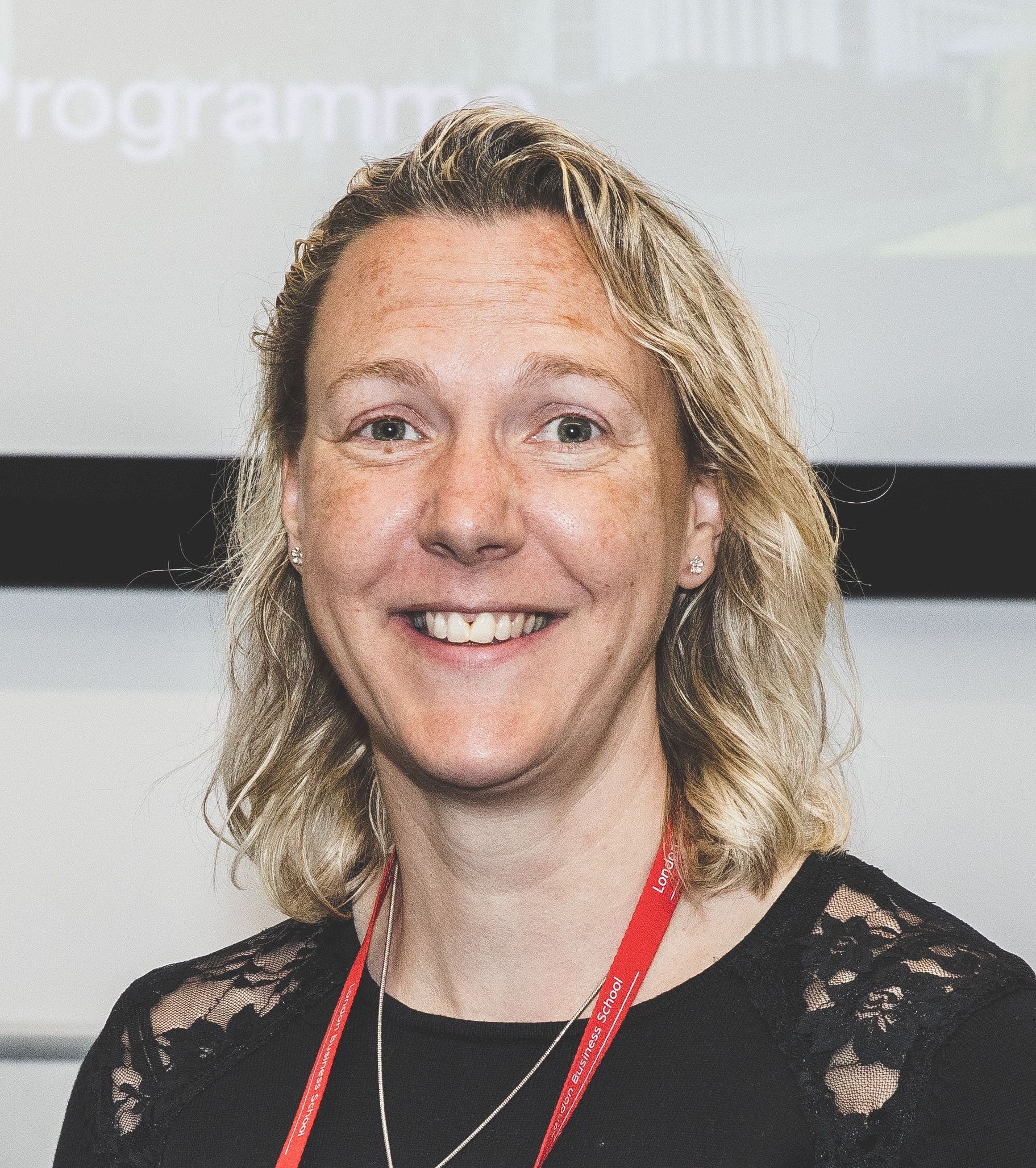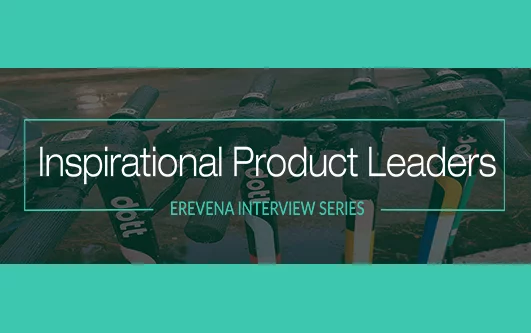Nicola Marlin, Chief Product & Technology Officer at Informa, tells Erevena’s Grant Hayward why having a combination of start-up and corporate experience makes the ideal product leader — and reveals what she believes gives female product leaders the edge.
Can you tell us a little about your background?
I’m a scientist by background, having done a degree in analytical chemistry, during which I spent a year at Glaxo Wellcome. I then went on to do a PhD identifying biomarkers for Alzheimer’s, which was sponsored by a subsidiary of Astra Zeneca. I’ve remained in the life sciences and healthcare domain ever since, joining a start-up at the age of 28. The company, deltaDOT, was a spin out from Imperial College London and I spent three years there.
How did that experience set you up for your continuing career?
It’s a well-known fact that when you join a start-up, out of necessity, you typically end up wearing many different hats. You’re speaking to the customer, you’re thinking about marketing, you’re talking with sales and getting involved in a bit of product development, as well as with the technology. It’s a perfect breeding ground for a product person. In fact, I’d say this ability to work with and across multiple functional teams is the core of any good product person. You need to be able to communicate with people at all touchpoints and that’s what working for a start-up taught me to do.
Why is this collaboration important for a product leader?
People often think managing a product portfolio begins and ends with building a product, but it’s so much more than the ‘build’. I prefer to talk about product owners creating a solution for a use case. In my case at Informa, this might mean working with various teams internally, or collaborating with external partners, and even through acquisition of the expertise we need. The whole product journey is intertwined, from idea, through market understanding, to product build, marketing, sales and beyond. And this level of collaboration needs good product management skills. I’ve seen companies without this expertise struggling because they’ve got so many great ideas and try to do them all — but just because an idea is great, doesn’t mean you need to do it. That’s where product management expertise can help.
How did you apply this expertise in your start-up role?
I was working with a small team at the time looking at how we could create something that was more repeatable, offering more value, to more people. We focused on doing one thing that is actually highly relevant right now — viral titrations, measuring how viruses grow. Previously this involved a wait of 48 hours between starting to grow the virus and getting a result. With our technology, we could get the result in a couple of hours. That was a huge value-add, so we focused on building out this one product rather than all the others, and this experience really sparked my passion for product management.
What prompted your move from the world of start-ups to big corporates?
I think you can reach a certain point in a start-up where, unless the business really grows massively, you begin to outgrow it. So, I moved across to Thomson Reuters to join their life sciences division. I spent seven years there and really got to see the corporate side of the industry and how it operates at scale, taking on more and more of the product portfolio along with a bigger team of product managers to help manage it.
How does life differ in a corporate compared with a start-up?
There are pros and cons to both. I always say that the optimum product environment would be to take the best parts of a start-up, the passion, the agility and the ability to do things quickly, and combine them with the good parts of a corporate, such as the funding, resources, and support from other teams, like marketing and technology so you don’t have to do everything yourself. I think my success at Thomson Reuters came from this combination, where I brought my start-up background and used it to engage with diverse groups, bringing a level of collaboration and empathy.
You’ve since joined Informa — how did that come about?
I jumped at the opportunity to join Informa which is a bit more dynamic, where I could use my start-up mentality again. There was a real willingness at Informa to change, grow and invest and they needed product leadership skills to make it happen. It’s what I wanted to do too, and I had the drive that’s so important in product management.
What do you find most exciting about what you do?
There are two answers to this. First, I am a problem solver. I enjoy making things happen — just ask any of my friends who are used to me organising things and fixing problems, such as glitches on holiday. I don’t see a problem as something that stops you doing what you want, I just find a better way of doing it. Second, I love engaging with our customers and talking to them about their challenges. I’m passionate about being able to overcome the barriers they’re facing with something that I know is going to have an impact, that I know is going to help them in their endeavours. To have that impact, you really need to know your customer so that you can make great ideas happen for them.
Does being a woman make you better at building these connections with your customers?
This is a really good career for women because one of the things you need as a product lead is strong collaboration skills. I think women can excel at that because they often have an open and collaborative approach. Sometimes corporate environments can get a little bit more competitive, and women tend to approach problems in a more non-confrontational way. The softer skills we deploy are very often what’s needed to get buy-in from all the different groups involved in what you’re trying to achieve. By ‘softer skills’ I don’t mean weakness — a product lead needs to be decisive and able to take on a challenge. Soft skills are about empathy and having an emotional understanding of the people you work with and for.
What advice would you give other women considering a career in product management?
I come back to the need to be decisive. Have a really clear view of what you feel and build data around that because people really struggle to argue with data. If you’ve done your validation and you’ve got the data, stick to your guns, but bring people on the journey with you. Sometimes as a woman we can try to accommodate too many strong opinions, but if you’ve got the data to support your case, use it. And that data is something you gather from your customers — what do they want, like, need? Your opinion, however interesting, is irrelevant, because the only opinion that is relevant is the customers. That’s what you build your dataset on.
What attributes do you look for in a good product manager?
I’m always looking at technical skill, for example have they managed a product before and built out and prioritized a roadmap? But more than that, a lot of what I look for in product managers is their thinking, their rationale and their culture. They need to be confident, to be able to persuade people that their ideas are great, validated by data, of course. And you can’t have an ego to be a good product manager because this is such a collaborative role.
I want them to be able to think strategically, to know which idea is the right one to pursue because of its potential commercial impact. Where I feel a lot of product managers fail is they really love the ideation and that ‘let’s start this ball rolling’ moment, then they deliver a product and think ‘that’s great, my job is done’. But, there’s so much more to it and I want a product manager who can see the end-to-end picture.
How do you attract new talent?
It is a challenge. I think it’s easier in the US than it is in Europe and the UK. In the US, the interpretation of product management covers the broader scope I’ve been talking about, whereas here the starting point is more often that it’s just about building a product. We need to define the space more broadly and not simply go after certain personas, limiting the scope. Quite often I’ll get someone who’s great technically, but doesn’t have the commercial aptitude, or they are excellent strategically, but haven’t collaborated with tech teams before. Getting the optimum blend is the hardest challenge we face in attracting talent.
Why do so many CEOs today come from product management backgrounds?
It’s down to the broad spectrum of experience you need as a product manager. You understand finance and how to build a business case. You understand how to run a product division, how to harness technology, and how critical marketing and sales are. If you’re a strong product lead, you’re very instrumental in the strategic vision of the company. All of this is what you also need as a CEO. I don’t mind admitting that my aspirational path would be towards a CEO position eventually.
Is there a CEO who inspires you?
Yes. Dame Emma Walmsley, the CEO GlaxoSmithKline is certainly somebody I admire. A female CEO of a pharma company is highly unusual. When I worked at Glaxo Wellcome many years ago, it was a very male dominated environment, so to see a woman at this level in our industry is really an inspiration.
Is there a product that you think is great?
I’m not sure there’s necessarily one product, but perhaps STRAVA is a good example of a company that found a niche — an app for runners and cyclists — and kept it simple and accessible. They started in an agile way and didn’t try to go all singing and dancing. They identified an unmet need and went after it. Now, it’s hugely adopted globally.
Do you have a career defining moment?
I’d say that my most pivotal moment was when I’d only been with Informa for six months and got promoted to head up the whole of product management. It was strong endorsement that I had a lot of ideas and would bring value to the company. This endorsement by a company I’d only recently joined was important because sometimes, as women, we don’t always believe in ourselves as much as others do.
Finally, what’s the future for you?
In my heart, I’ve probably always thought I would end up back in the start-up world. When that might happen, I don’t know. Certainly not tomorrow. But I do believe that where I am successful in the corporate world is because of my start-up mentality.
Share this article:













